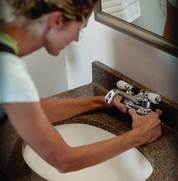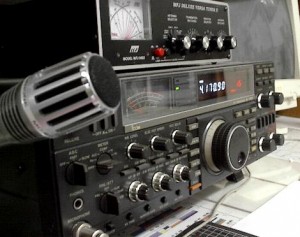Right now, kids across the country are headed back to school. Why not take time to focus on learning yourself? After all adults need not be left out. Check out these nationwide classes to expand your mind or develop new — often lifesaving skills.
Home improvement
Home Depot
Home Depot offers great FREE national classes in cool things like decorative paint  techniques, installing a faucet, tile flooring and insulation.
techniques, installing a faucet, tile flooring and insulation.
Health/emergency
The National Safety Council
The National Safety Council offers courses in emergency care for beginners as well as training and certification programs for instructors. Topics include dealing with infectious blood borne pathogens. The NSC touts this course as useful for those who may come in contact with pathogens as a part of their job, but it could make you the most popular lid on the block in the event of a biological terrorist attack or a mass outbreak of a disease such as SARS, avian flu or the plague.
The NSC also teaches standard first aid, automated external defibrillation (AED) and various forms of CPR. For some classes, knowledge-based portions of the course can be done online with only the required hands-on skills taught at the NSC center. Fees for online courses range from just a few dollars to hundreds for an organization’s training kit. Check out all of the available programs at nsc.org. Take this first aid training for instance.
First Aid, CPR and AED Training for the Workplace
Red Cross
The Red Cross also offers a number of classes in first aid, CPR, AED and bloodborne pathogens.
Community First Aid- From CPR, first aid and automated external defibrillator (AED) training to injury prevention courses, bloodborne pathogens training and community disaster education, you can team up with the most trusted name in health and safety training for nearly a century – the American Red Cross. Red Cross training offers complete, flexible programs that help you, your family and your community stay prepared for virtually any life-threatening situation. Build the program that works for you using our modular curriculum. Contact your local Red Cross chapter for more information.
Community First Aid and Safety (9 1/2 hours)
One of our most popular courses, it is great for community needs. This course combines lectures, demonstrations and video with hands-on training and practice. Participants in this course learn to recognize and respond to emergencies including shock, cardiac and breathing emergencies for adults, children and infants, heat and cold emergencies, sudden illnesses and poisonings. Additionally, participants will learn first aid for everything from cuts and scrapes to muscle, bone and joint injuries.
Adult CPR (3 3/4 hours)
For the person who only needs adult CPR training, this hands-on skills training prepares them to respond to breathing and cardiac emergencies in victims aged 8 and above. Adult CPR/AED is available in a 4-1/2 hour course with AED training included.
Available in English and Spanish
Infant and Child CPR (5 1/2 hours)
Designed for those who care for children, either full time or occasionally, this course teaches participants how to recognize and care for breathing and cardiac emergencies in infants and children up to 8 years. Participants take home a refresher skills card as well as information about preventing injuries. Infant CPR is also available separately as a 3 ½ hour course that applies to infants up to 12 months; Child CPR (4 hours) is available separately and applies to children age 1 to 8 years.
Available in English and Spanish.
AED Essentials (2 hours)
This course teaches individuals currently certified in Adult CPR how to safely use an AED to provide care for victims of sudden cardiac arrest.
Available in English and Spanish.
Sport Safety Training (6 1/2 hours)
The American Red Cross and the United States Olympic Committee have joined forces to develop an exciting coach for coaches who want to keep their athletes safe. This course covers sports-related injury prevention, first aid care and Adult CPR. An optional Child CPR component may also be taken. This course is a must for coaches, officials and parents of athletes.
Babysitter’s Training (6 hours)
The Babysitter’s Training course has a unique interactive, educational format that tasks youth, ages 11 – 14 years of age, with activities such as identifying safety problems around the house and yard and selecting age-appropriate toys and games for children in their care. Participants learn by doing. This format, along with the course video and an enthusiastic instructor, keeps the interest of the babysitters and provides a meaningful classroom experience
Pet First Aid is a handy reference guide for cat and dog emergencies. Created by the American Red Cross and The Humane Society of the United States, Pet First Aid provides assistance to people whose pets are ill or injured.
They also offer classed in lifeguarding.
- Skills and knowledge to prevent and respond to aquatic emergencies
- CPR for the Professional Rescuer
- Water First Aid
Guns
The trigger happy among us should check the NRA for courses in all things gun-related.
The NRA Range offers a wide variety of classes and seminars for the shooting enthusiast. From the NRA Basic Firearm course to “how-to” classes, to more advanced courses in several disciplines, the NRA offers it all. Classes are taught by professional Certified Firearms Instructors and nationally-recognized guest instructors. Call (703) 267-1400 for more details. Or, call the grassroots hotline at 800-392-8683. Or click here to learn more.
 Find an Amateur Radio License Class
Find an Amateur Radio License Class
CQ, CQ, CQ! That’s the call to find another radio ham. ARRL can help you find an Amateur Radio license preparation class in your community. You can search their database for upcoming classes near you. Once you have the license you are qualified to use special wavelengths, bypassing the need to use the internet or a cellular system in an emergency.
As an alternative to classes listed in the geographic database that are offered in various locations throughout the US, click here to look for classes for license preparation offered online.
 SCUBA with PADI, the Professional Association of Diving Instructors®
SCUBA with PADI, the Professional Association of Diving Instructors®
While learning to dive isn’t the cheapest thing to learn, it’s great fun and you can use the qualification in pretty much any diving center in the world. PADI is the world’s leading scuba diver training organization.
With more than 6200 PADI Dive Centers and Resorts, and more than 136,000 individual PADI Professionals who have issued more than 23 million certifications around the world, you’ll find PADI diver courses and scuba diving services nearly everywhere.
Performance-Based Learning – You progress at your own pace as you demonstrate mastery of specific performance requirements essential to becoming a scuba diver. You must earn your PADI certification, but you do so in an encouraging and well-supported learning environment.
Educational Standards – All PADI programs, from entry-level through scuba instructor training, fall under strict educational standards monitored for worldwide consistency and quality. PADI takes a proactive approach to quality management and randomly surveys PADI Divers to confirm their courses meet PADI’s high standards as well as the divers’ expectations. No other diver training organization works to maintain this level of professional reliability and integrity.
Continuing Diver Education – The fun and enjoyment of being a confident scuba diver is fueled by continuing to improve your scuba skills. Each PADI course builds on the previous one, teaching you skills and techniques when you’re ready to learn them. PADI specialty courses let you explore specific dive interests. Professional-level courses let you live the scuba diving lifestyle by becoming a divemaster or scuba instructor.
College Credit and Vocational Training – The unsurpassed quality of PADI materials, and the educational validity of PADI courses, have been independently acknowledged by international educational and vocational training authorities. You may be able to earn college credit for certain PADI courses, or receive vocational training recognition toward national certificates.


